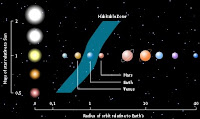Judging from the fact that the Habitable Zone (HZ) is such a narrow region around a star or a galaxy, the difficulty in searching for planets and life around such areas calls for an alternative route:
I simply propose that we "consider" life in a region that we can call, The Extremophile Zone (EZ).
Any area that lie outside the Habitable Zone can potentially be an Extremophile Zone. Introducing this concept will expand the venue of our efforts in the search for life.
You see, we are at a kind of stand-still right now in where we aim to find life: Liquid water at the Goldilocks Zone. It is a major guide in the search for life but it is out-of-reach for those who do not have the specific instruments, or the right kind of telescopes.
Perhaps a different approach may prove to be fun and imaginative at the same time. Instead of snobbing exoplanets that are not within the habitable zone, we could instead appreciate them more and then postulate the "extreme" forms of life that may thrive on each new-found world (small "bubbles" of Habitable Zones may even exist within extremophile zones).
A web-based system can be built that stores updated exoplanetary data and then also accept ideas from enthusiasts, amateurs and professionals about what type of extreme life could survive on each world if it did manage to start up. This "proactive" system would then be a mix of crowdsourcing, web2.0/social media, gaming, and an expert system, or AI. (See how the Fold.It, and GalaxyZoo is facilitated).
It's somewhat of a different flow than the usual search for life. This method will bank on sheer numbers of factual data, plus a massive input of theory and imagination, a creative dose of fun, and an ingenious system to crunch it all into 'diamonds'. In time, with some fuzzy logic and Science, perhaps it may produce useful insights regarding life on future exoplanet discoveries.
Imagine a database of a thousand exoplanets each with a hundred ideas--honed via web2.0, social media, or even peer review--on how life may thrive on it. And then imagine a system that will mix-and-match ideas with the properties of the newest exoplanet discovery. I think it will produce a valid insight and might give Astrobiologists some new biomarkers to look for. It may even form another loop in scientific research.
A thousand exoplanet count is not too far off (we have a total of 349 as of this writing). Perhaps next year we'll reach that milestone.
Now imagine ten thousand worlds and the brain of a HiveMind+AI thinking about life on those worlds. The possibilities are enormous. And if such a system ever materializes in the future, then it will make every exoplanet discovery as precious and important as the ones that lie in the Habitable Zone.

